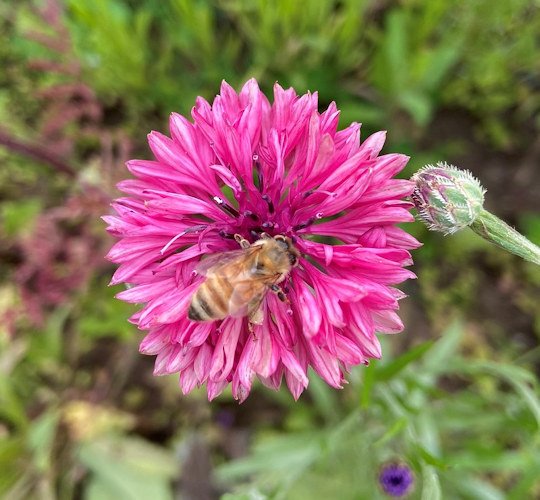OSU study to provide insight into optimal nutrition for bees, amid global decline

CORVALLIS, Ore. (KTVZ) – A new grant will allow Oregon State University researchers to study the nutritional value of more than 100 bee-pollinated crops, native plants and commonly used ornamental plants, a project that could help scientists better understand the global decline of bee populations.
Certain plants attract bees more than others, but whether those flowers contain the optimal nutrition needed for the insects has yet to be determined. The grant will allow researchers in the Honey Bee Lab led by Ramesh Sagili, OSU associate professor of apiculture and OSU Extension specialist, and Priyadarshini Chakrabarti, former OSU research assistant and new assistant professor at Mississippi State University, to begin to fill that knowledge gap.
With the $500,000 grant from the U.S. Department of Agriculture’s Agriculture and Food Research Initiative, the team hopes to improve bee nutrition by building a database of macro and micronutrients found in the flowering plants used in the study. Poor nutrition due to agricultural mono-cropping and loss of habitat is an important factor in bee declines and the researchers anticipate alleviating this problem by providing better forage choices for bees backed by science-based results.
In addition to beekeepers, land managers, conservation groups will benefit from the data base. The public also will be able to use the information to choose the most nutritious plants for both native and managed bees.
With global decline in both native and honey bee populations and given the importance of honey bees for commercial pollination of hundreds of crops, choosing the best supplemental forage can help mitigate poor nutrition in bees. Well-nourished bees can also better withstand things that plague them like Varroa mites, pesticides, parasites and loss of habitat.
“If you look at it from the human side, the healthier you are, the better you can fight off diseases, parasites and other health issues,” Sagili said. “With a better immune system, you’re stronger and more resilient. It’s the same with bees. Nutrition is their first line of defense against stressors.”
Optimal nutrition has been shown to enhance resistance to stressors and increase survival and longevity, according to Chakrabarti. Even though there has been much research done to determine the causes of honey bee decline, few studies have addressed the underlying problems of bee nutrition.
For the past few years there has been a significant movement to improve nutrition and increase habitat for bees and to provide better forage, Chakrabarti said. For farmers, it’s important to understand the nutrition contained in pollens from significant crops like almonds in California, a $7 billion industry that relies on honey bees for pollination.
“There are efforts geared toward famers so that they can plant supplemental forage adjacent to their orchards or fields to provide the additional nutritional resources that bees need,” Sagili said. “Seventy-five percent of honey bee hives managed by beekeepers in the United States go to California’s Central Valley in February to pollinate the almonds and they need forage before the almonds come into bloom. That’s a big, big problem. There might be some wild mustard or dandelion, but it’s really meager and there is no other source of pollen for bees.”
Beekeepers feed the honey bees with sugar syrup and protein supplements when natural forage is unavailable, which is not the optimal diet but can sustain bees for the short term.
The impacts of certain fungicides – called sterol biosynthesis inhibitors or SBI – will also be investigated to determine their effect on the availability of pollen sterol and bee health, Sagili said. Pollen sterols are a type of lipids that are required for development and growth of bees. Findings from examining the impacts of SBI fungicides on sterol availability in pollen will not only show how these widely used fungicides may affect bees, but also demonstrate for the first time if this group of fungicides could compromise the quality of pollen.
Sagili and Chakrabarti are looking for community scientists to help with the study. Those interested in participating can contact Sagili at 541-737-5460; or ramesh.sagili@oregonstate.edu, and Priya Chakrabarti at priyadarshini.chakrabarti@oregonstate.edu).